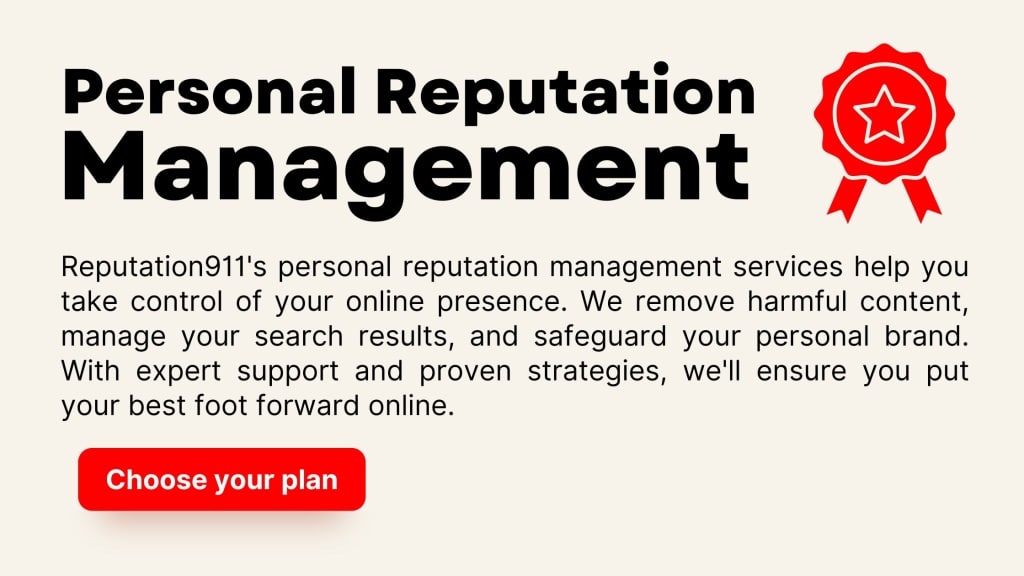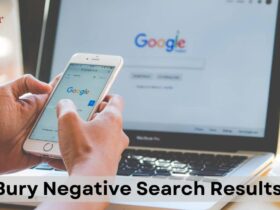Did you just Google yourself only to find some… unflattering search results? Whether it’s a negative article, an embarrassing post, or old information you’d rather forget, this can be jarring. At worst, this can ruin your ability to find a new job, build a personal brand, or even just make a good impression online. Don’t panic – today, you’ll learn how to clean up your online reputation fast.
Why Your Online Search Results Matter:
I don’t need to explain to you why your personal reputation matters. You probably already know that if you’re here!
But, I will explain why your search results matter for your reputation.
Here are a few reasons why your search results can make or break your personal and professional image:
1. First impressions happen online
Whether you’re applying for a job, networking, or dating, people will likely Google you before meeting you. Studies show that over 80% of employers Google candidates during the hiring process. The first page of results is often the only impression they get, so it needs to reflect the best version of yourself.
The good news is, most people don’t click past the first page of Google.
2. Your digital presence is your personal brand
These days, everyone needs to build their personal brand online, especially for professional purposes. Your search results tell your story, for better or worse.
Clients, coworkers, partners, and others will form opinions about you based on the information they find. A clean, professional digital presence signals credibility and reliability, while negative results can raise red flags.
3. Negative results stick, and they can impact your future
Unfortunately, negative information online doesn’t just disappear. Unless you take proactive steps, these results can linger and haunt you for years to come.
Imagine losing your job (or even not getting the job to begin with) because of a social media post. Believe it or not, this happens pretty often.
4. It’s not just about reputation – it’s about safety too
Outdated or inaccurate information circulating online can be embarrassing. But, it can also post risks to your safety and privacy, including identity theft. Most people don’t realize how much of their personal information is out there online. Not just basic contact information, but unflattering details about your past too.
When to Clean Up Your Online Reputation
Certain moments in life happen where your online reputation is especially critical. Here are some key situations where having a positive online reputation can help you out:
- Searching for a new job. Negative search results can mean the difference between getting an offer or your resume going in the trash. A polished reputation reassures employers that you’re a professional they can trust.
- Growing your personal brand. If you’re a freelancer or entrepreneur, your personal brand is everything. Search engine results shape how potential clients and followers perceive you, so you need to put your best foot forward.
- Apartment hunting. Landlords and property managers may do a quick search on potential renters. If they find anything questionable, it could hurt your chances of securing the rental you want. A clean online reputation shows you’re a reliable tenant.
- Online dating. Don’t lie, you definitely Googled your last Tinder match, right? Well, they probably Googled you too, meaning your search results can shape your potential date’s first impression of you. Making sure your results are positive and accurate helps make a good impression.
- Growing a social media following. Aspiring influencers with a growing online following need to keep their digital footprint in check. Your followers will look up to you. Plus, a spotless online reputation makes you a more attractive partner for brands and potential sponsors.
- Burying old mistakes. If negative content – like a news article, blog post, or legal issue – surfaced online, it can interfere with your life. Everyone deserves a fresh start, and cleaning up your reputation can help you move forward.
Can I Delete Search Results That I Don’t Want From Google?
Unfortunately, you can’t clean your name online by deleting search results.
Google is simply a search engine, which means it indexes content from other sites, but doesn’t own that content. To delete something from Google, you typically need to go to the original source.
In some cases, Google will remove certain types of content from search results. If the content contains personal information or violates Google policies, you can request removal.
For most people, the best strategy is search engine suppression.
Why?
Because Google’s algorithm prioritizes the most relevant, recent, and credible content. So, creating new, positive, and high-quality online content can help drown out those pesky unwanted results.
9 Steps to Clean Up Your Online Reputation FAST
Step 1: Set up a spreadsheet
Start by creating a Google or Excel spreadsheet, which you’ll use to keep track of your online content.
Make separate columns for:
- Positive content: Anything that makes you look good & you want to promote.
- Neutral content: Anything that is neither good nor bad.
- Negative content: Anything you want to remove right away.
Make rows for:
- Owned content: Anything you directly control, like social media accounts, personal websites, etc.
- Unowned content: Anything you do do not control, like articles written about you
Step 2: Search yourself in incognito mode
A quick self-Google can reveal a lot about your current reputation, both the good and bad.
- Start by opening a private or incognito browser window. That way, your personal browsing history won’t influence your search results. This gives you a more accurate view of what a stranger would see.
- Google your full name, nickname, and any other variations that others might use to look you up. If you have a common name, try including your location, profession, or middle name to narrow down the results.
- Pay particular attention to the results on the first and second page of Google.
- Add your results to your spreadsheet, and categorize them as positive, neutral, or negative.
Step 3: Log into your sites and profiles
Now that you’ve seen what’s out there, it’s time to take a closer look at the content you own directly. You should log into all your online accounts, including:
- Social media profiles like Facebook, Instagram, Twitter, LinkedIn, TikTok, Snapchat, Pinterest, Reddit, etc.
- Your personal website, if you already have one.
- Blogging platforms like Medium, Blogger, Tumblr, etc
- Professional profiles like Behance, LinkedIn, etc
- Community and forum profiles like Reddit or Quora.
Add each account to your spreadsheet in the “owned” category. For now, if you think there might be something negative on it, add it to the “negative” column.
Step 4: Remove or edit owned content
Now that you have a list of your owned content, it’s time to go through each account with a fine-toothed comb. Remove or edit out anything that doesn’t align with the positive image you want to project.
After going through an account, move it into either the “neutral” or “positive” column.
Step 5: Keep your personal accounts private
Now, set your personal social media accounts to private. Only accept follow requests from people you know. Do not accept friend requests from professional contacts or strangers.
Some social media platforms allow you to turn off search engine indexing. You should do this if you don’t want your profile to appear in search engine results.
For any professional accounts, keep them public. However, ensure they only contain positive, professional content.
Step 6: Request removal or edits of unowned content
After tackling your owned content, let’s move over to content you don’t directly control. for now, focus on the “negative” and “unowned” section of your spreadsheet.
- Reach out to webmasters, site admins, or journalists to edit or remove negative news stories about you.
- Search your name on people search sites and take down your profile.
- Ask your friends or family to remove any negative photos or mentions of you on their social media.
Remember, this part may take some time, if people agree to remove the content at all. You likely won’t be able to remove everything, which brings us to the next step…
Step 7: Stay active online
Now is NOT the time to stop posting online. This may sound counterintuitive, but there is a reason for this.
Google favors the most recent and relevant content. If you don’t create any new content, all the bad content about you will be the most recent.
That means it will show up highly in Google search results for you.
Instead, you need to start creating and posting new, positive content ASAP.
To do this, you can:
- Set up your own website to establish a professional presence. This is the perfect way to start building your personal brand through blogging.
- Create or update public profiles to highlight your skills and achievements.
- Regularly post positive content to help drown out any negative results in search engines.
- Link your profiles and websites together. This helps to bring them all up in search results together, drowning out any negativity.
- If you own a business, start addressing negative reviews.
Step 8: Remember the content golden rules
Remember these key tips when creating new content:
- Keep your new content professional and relevant to your personal brand. This is your opportunity to reflect on what you want to be known for.
- Focus on quality. You may want to create loads of new content right away to drown out your negative results. But, low-quality content could backfire. Focus on building value and credibility with your audience.
- Be consistent. Don’t just “post and ghost”. You can definitely get some quick wins with these steps. But, consistency will protect your reputation for the long-term.
Step 9: Monitor your results
Lastly, don’t forget to monitor your results. Hopefully, you’ve made some significant progress already, and you have more results in your “positive” column than “negative”.
At this point, set up Google Alerts for your name and other variations to receive notifications of new mentions. Periodically Google yourself and check your spreadsheet to make updates and track changes in your reputation.
Conclusion: Clean Up Your Online Reputation NOW
If you’re in desperate need of a reputation clean up, doing all this can be overwhelming. Plus, sometimes your reputation problems end up being bigger than you thought.
That’s where the professionals come in. Reputation911 offers comprehensive personal reputation management, including content removal, suppression, crisis management, and more. Contact us today for a free consultation and get your reputation back on track.
William DiAntonio is the Founder & CEO of Reputation911, a reputation management firm he founded in 2010 that has earned the trust of its clients for over a decade by helping individuals, businesses and brands control their online search results.















